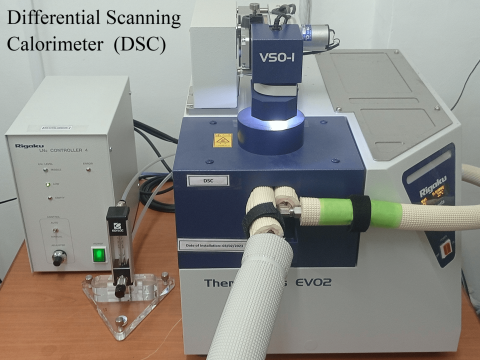
External users: registration to be carried out only through I-STEM portal
Additional information about sample and analysis details should be filled in the pdf form provided in the I-STEM portal under “DOWNLOAD CSRF”
Internal users (IITB): registration to be carried out only through DRONA portal
Additional information about sample and analysis details should be filled in the pdf form provided here.
.
Category
- Material Characterization » Thermal Characterisation
Booking Details
Minimum temperature: -150 °C
Rate of degree : 10°C /Min to 20 °C /Min
Gas Type :N2
Sample type: Powder
Facility Management Team and Location
Prof. Sanjog S. Nagarkar.
Prof. Srinivasan Ramakrishnan.
Prof. Guruswamy Kumaraswamy (Chemical Eng.)
Prof. Narendra Shiradkar (Electrical Eng.)
Facility Features, Working Principle and Specifications
Facility Description
The Differential Scanning Calorimeter (DSC) is used to quantify the energy changes occurring during phase transitions, such as melting (Tm), solid-solid phase transitions, crystallization (Tc), and glass transition (Tg) temperatures. It is widely employed in research and development as well as quality control, particularly in the fields of polymer science, pharmaceuticals, and glass research.
Differential scanning calorimetry (DSC) works by measuring the difference in thermal energy applied to a sample and a reference material as a function of temperature. The device that performs this measurement is called a differential scanning calorimeter, or DSC
Sample Preparation, User Instructions and Precautionary Measures
1) Sample form: powder (~25 mg).
2) The analysis can't be carried out if the temperature range and the heating rate/ heating cycle are not specified.
3) Explosive, poisonous samples and samples giving rise to toxic/obnoxious gases/fumes on heating cannot be undertaken for DSC.
4) The sample holders are of Aluminum (Al) and Platinum (Pt). The user must ensure that samples will not react with crucible materials during DSC Analysis.
5)TGA data is mandatory for any DSC analysis. Without TGA data, DSC analysis will not be
performed. Weight loss during TGA should not be more than 2% for DSC analysis range.
In order to safeguard the instrument from the damage it is absolutely essential that you must state the decomposition products associated with the heating cycle of your sample. Any functional group which might potentially explode, or form foams is strictly not allowed (Representative examples are Azide, Perchlorate, poly-nitro or nitrogen-rich compounds, etc.) Explosive, poisonous samples and samples giving rise to toxic/obnoxious gases/fumes on heating cannot be undertaken for Thermal Analysis.
Charges for Analytical Services in Different Categories
Internal Users | 1. Rs. 50 per sample for standard measurement 30-500 °C @ 10°C/min. |
2. For measurements >500 °C the charges will be 100 Rs/hour/sample. | |
External Users(Academic) | 1. Rs. 100 per sample for standard measurement 30-500 °C @ 10°C/min. |
2. For measurements >500 °C the charges will be 200 Rs/hour/sample. | |
External Users(National R&D labs) | 1. Rs. 500 per sample for standard measurement 30-500 °C @ 10°C/min. |
2. For measurements >500 °C the charges will be 700 Rs/hour/sample. | |
External Users(Industry & | 1. Rs. 750 per sample for standard measurement 30-500 °C @ 10°C/min. |
2. For measurements >500 °C the charges will be 1000 Rs/hour/sample. |
Analysis condition other than standard condition will be charges per hour.
